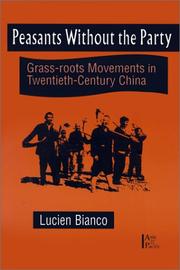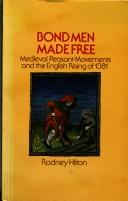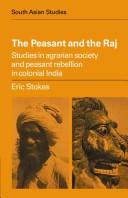| Listing 1 - 10 of 48 | << page >> |
Sort by
|

ISBN: 1563248409 1315701855 1317463102 9781317463108 9781315701851 9781317463085 1317463080 9781317463092 1317463099 1563248395 9781563248399 9781563248405 9781563248399 9781563248405 Year: 2015 Publisher: Abingdon, Oxon New York
Abstract | Keywords | Export | Availability | Bookmark
 Loading...
Loading...Choose an application
- Reference Manager
- EndNote
- RefWorks (Direct export to RefWorks)
Exploring one of the most dynamic and contested regions of the world, this series includes works on political, economic, cultural, and social changes in modern and contemporary Asia and the Pacific. The leading specialist on China's twentieth century peasant resistance reexamines, in bold and original ways, the question: Was the Chinese peasantry a revolutionary force? Where most scholarly attention has focused on Communist-led peasant movements, Bianco's story is one of peasant thought and action largely unmediated by modern political parties. This volume pays particular attention to the firs
Book
ISBN: 1283578743 9786613891198 1400820324 9781400820320 Year: 2012 Publisher: Princeton, NJ
Abstract | Keywords | Export | Availability | Bookmark
 Loading...
Loading...Choose an application
- Reference Manager
- EndNote
- RefWorks (Direct export to RefWorks)
The triumphant rise of Louis Napoleon Bonaparte over his Republican opponents has been the central theme of most narrative accounts of mid-nineteenth-century France, while resistance to the coup d'état generally has been neglected. By placing the insurrection of December 1851 in a broad perspective of socioeconomic and political development, Ted Margadant displays its full significance as a turning point in modern French history. He argues that, as the first expression of a new form of political participation on the part of the peasants, resistance to the coup was of greater importance than previously supposed. Furthermore, it provides and appropriate testing ground for more general theories of peasant movements and popular revolts.Using manuscript materials in French national and departmental archives that cover all the major areas of revolt, the author examines the insurrection in depth on a national scale. After a brief discussion of the main characteristics of the insurrection, he analyzes its economic and social foundations; the dialectic of repression and conspiracy that fostered the political crisis; and the armed mobilizations, violence, and massive arrests that exploded as the result. A final chapter considers the implications of the insurrection for larger issues in the social and political history of modern France.
Peasant uprisings --- France --- History
Book
ISBN: 0299233138 9780299233136 0299233146 9780299233143 9780299233143 Year: 2009 Publisher: Madison, Wis. University of Wisconsin Press
Abstract | Keywords | Export | Availability | Bookmark
 Loading...
Loading...Choose an application
- Reference Manager
- EndNote
- RefWorks (Direct export to RefWorks)
Peasant uprisings --- History --- Ireland
Book

ISBN: 0691022658 1400860121 0691607990 9781400860128 Year: 2014 Publisher: Princeton, NJ
Abstract | Keywords | Export | Availability | Bookmark
 Loading...
Loading...Choose an application
- Reference Manager
- EndNote
- RefWorks (Direct export to RefWorks)
Since the Mexican Revolution of 1910-1920, Mexico's rebellious peasant has become a subject not only of history but of literature, film, and paintings. With his sombrero, his machete, and his rifle, he marches or rides through countless Hollywood or Mexican films, killing brutal overseers, hacienda owners, corrupt officials, and federal soldiers. Some of Mexico's greatest painters, such as Diego Rivera, have portrayed him as one of the motive forces of Mexican history. Was this in fact the case? Or are we dealing with a legend forged in the aftermath of the Revolution and applied to the Revolution itself and to earlier periods of Mexican history? This is one of the main questions discussed by the international group of scholars whose work is gathered in this volume. They address the subject of agrarian revolts in Mexico from the pre-Columbian period through the twentieth century. The volume offers a unique perspective not only on Mexican riots, rebellions, and revolutions through time but also on Mexican social movements in contrast to those in the rest of Latin America.The contributors to the volume are Ulises Beltran, Raymond Buve, John Coatsworth, Romana Falcon, John M. Hart, Evelyn Hu-DeHart, Friedrich Katz, William K. Meyers, Enrique Montalvo Ortega, Herbert J. Nickel, Leticia Reina, William Taylor, Hans Werner Tobler, John Tutino, Arturo Warman, and Eric Van Young.Originally published in 1988.The Princeton Legacy Library uses the latest print-on-demand technology to again make available previously out-of-print books from the distinguished backlist of Princeton University Press. These editions preserve the original texts of these important books while presenting them in durable paperback and hardcover editions. The goal of the Princeton Legacy Library is to vastly increase access to the rich scholarly heritage found in the thousands of books published by Princeton University Press since its founding in 1905.
Peasant uprisings --- Peasants' uprisings --- Uprisings, Peasant --- Regions & Countries - Americas --- History & Archaeology --- Mexico --- Insurgency --- Revolutions --- History --- Mexico - History. --- Peasant uprisings - Mexico - History. --- History.
Book
ISBN: 143845385X 9781438453859 1438453833 9781438453835 Year: 2014 Publisher: Albany, NY
Abstract | Keywords | Export | Availability | Bookmark
 Loading...
Loading...Choose an application
- Reference Manager
- EndNote
- RefWorks (Direct export to RefWorks)
Robin Hood–style revolutionary Wei Baqun is often described as one of China's "three great peasant leaders," alongside Mao Zedong and Peng Pai. In his home county of Donglan, where he started organizing peasants in the early 1920s, Wei Baqun came to be considered a demigod after his death—a communist revolutionary with supernatural powers. So much legend has grown up around this fascinating figure that it is difficult to know the truth from the tale. Presenting Wei Baqun's life in light of interactions between his local community and the Chinese nation, Red God is organized around the journeys he made from his multiethnic frontier county to major cities where he picked up ideas, methods, and contacts, and around the three revolts he launched back home. Xiaorong Han explores the congruencies and conflicts of local, regional, and national forces at play during Wei Baqun's lifetime while examining his role as a link between his Zhuang people and the Han majority, between the village and the city, and between the periphery and the center.
Communists --- Peasant uprisings --- History --- Wei, Baqun,

ISBN: 0416825206 1134374682 1138173274 1280095199 0203426657 1134374674 9780203426654 9781134374687 Year: 2003 Publisher: London New York Routledge
Abstract | Keywords | Export | Availability | Bookmark
 Loading...
Loading...Choose an application
- Reference Manager
- EndNote
- RefWorks (Direct export to RefWorks)
Rodney Hilton's account of the Peasant's Revolt of 1381 remains the classic authoritative text on the 'English Rising'. Hilton views the revolt in the context of a general European pattern of class conflict. He demonstrates that the peasant movements that disturbed the Middle Ages were not mere unrelated outbreaks of violence but had their roots in common economic and political conditions and in a recurring conflict of interest between peasants and landowners.Now with a new introduction by Christopher Dyer, this survey remains the leading source for students of medieval English peasantry.
Tyler's Insurrection, 1381. --- Peasant uprisings --- History --- Great Britain --- Peasants' uprisings --- Uprisings, Peasant --- Insurgency --- Revolutions --- Peasants' Revolt, 1381 --- Wat Tyler's Insurrection, 1381

ISBN: 1316170519 0521297702 1316176053 1316173747 051193615X 1316177920 0511563418 0511865392 1316174840 9781316177921 9780511563416 0521216842 9780521216845 9780521297707 1322177481 Year: 1978 Volume: 23 Publisher: Cambridge New York
Abstract | Keywords | Export | Availability | Bookmark
 Loading...
Loading...Choose an application
- Reference Manager
- EndNote
- RefWorks (Direct export to RefWorks)
These twelve essays explore the nature of south Asian agrarian society and examine the extent to which it changed during the period of British rule. The central focus of the book is directed to peasant agitation and violence and four of the studies look at the agrarian explosion that formed the background to the 1857 Mutiny. The essays give a coherent historical treatment of the Indian peasant world, and the paperback edition of this successful book will be of interest to the student of peasant studies and to the sociologist as well as to development economists and agronomists generally.
Land tenure --- Peasants --- Peasant uprisings --- History. --- Peasants' uprisings --- Uprisings, Peasant --- Peasantry --- Insurgency --- Revolutions --- Agricultural laborers --- Rural population --- Marks (Medieval land tenure) --- Villeinage --- History --- Arts and Humanities --- Land tenure - India - History --- Peasant uprisings - India - History --- Peasants - India - History
Book
ISBN: 1684174961 Year: 2009 Publisher: Cambridge, Massachusetts : Harvard University Asia Center,
Abstract | Keywords | Export | Availability | Bookmark
 Loading...
Loading...Choose an application
- Reference Manager
- EndNote
- RefWorks (Direct export to RefWorks)
Peasant uprisings --- Peasants --- Revolutions --- History --- China --- Rural conditions. --- Social conditions
Book
ISBN: 1503627705 9781503627703 9781503615069 9781503627697 Year: 2021 Publisher: Stanford, California
Abstract | Keywords | Export | Availability | Bookmark
 Loading...
Loading...Choose an application
- Reference Manager
- EndNote
- RefWorks (Direct export to RefWorks)
The US invasion of Iraq in 2003 and the Arab uprisings of 2010-11 left indelible imprints on the Middle East. Yet, these events have not reshaped the region as pundits once predicted. With this volume, top experts on the region offer wide-ranging considerations of the characteristics, continuities, and discontinuities of the contemporary Middle East, addressing topics from international politics to political Islam, hip hop to human security. This book engages six themes to understand the contemporary Middle East-the spread of sectarianism, abandonment of principles of state sovereignty, the lack of a regional hegemonic power, increased Saudi-Iranian competition, decreased regional attention to the Israel-Palestine conflict, and fallout from the Arab uprisings-as well as offers individual country studies. With analysis from historians, political scientists, sociologists, and anthropologists, and up-to-date discussions of the Syrian Civil War, impacts of the Trump presidency, and the 2020 uprisings in Lebanon, Algeria, and Sudan, this book will be an essential guide for anyone seeking to understand the current state of the region.
Middle East --- History --- Arab uprisings. --- Islamism. --- New Middle East. --- human security. --- neo-patrimonialism. --- neoliberalism. --- proxy war.
Book
ISBN: 135188123X 1315236834 Year: 2016 Publisher: London ; New York : Routledge,
Abstract | Keywords | Export | Availability | Bookmark
 Loading...
Loading...Choose an application
- Reference Manager
- EndNote
- RefWorks (Direct export to RefWorks)
Government, Resistance to --- Peasant uprisings --- Revolutions --- Insurgency --- History --- Great Britain --- England --- Social conditions
| Listing 1 - 10 of 48 | << page >> |
Sort by
|

 Search
Search Feedback
Feedback About UniCat
About UniCat  Help
Help News
News